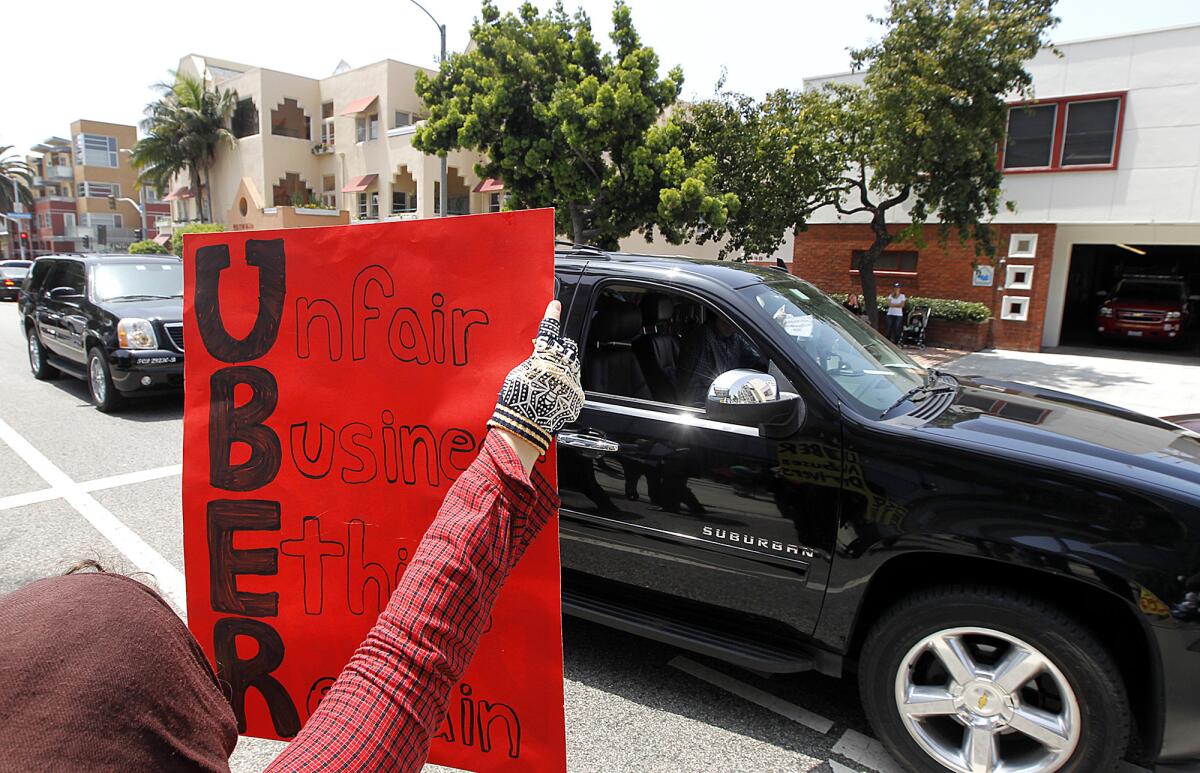Uber, Lyft hit with claims of more than $630 million in back wages

- Share via
More than 2,000 California ride-hailing drivers have filed wage claims against Uber and Lyft since February, alleging the companies have illegally treated them as independent contractors and owe them more than $630 million in lost wages, expenses and damages.
By calling attention to the influx of claims, the drivers, organized by Los Angeles labor group Rideshare Drivers United, hope to pressure the state to enforce Assembly Bill 5, a law that established stricter standards for companies that treat workers as contractors rather than employees.
The drivers, along with members of the Transport Workers Union, plan to caravan outside the offices of the California labor commissioner as well as the Employment Development Department in Los Angeles and San Francisco on Thursday to demand that the state enforce AB 5 so they can qualify for unemployment insurance benefits and receive the wages they say they were wrongfully denied through misclassification.
Stacey Wells, a spokeswoman for the App-Based Drivers Services Coalition, which represents both Uber and Lyft, said stepped-up enforcement of AB 5 would only hurt workers in the gig economy. “Forcing app-based rideshare and delivery drivers to become employees — which the vast majority have repeatedly said they do not want — will result in the widespread elimination of work for hundreds of thousands of Californians at the very worst possible time,” Wells said in a statement.
Some groups have called for the suspension of AB 5, arguing the law makes it difficult for freelancers to find work while stay-at-home orders remain in effect. But groups including Rideshare Drivers United say the coronavirus pandemic highlights the need for employee benefits and protections to ease the fallout from an economic downturn. Those protections include paid sick leave and unemployment insurance.
“For whatever reason, neither the state nor the cities that are empowered by the law to enforce AB 5 have taken hard action to do so,” Nicole Moore, an organizer with Rideshare Drivers United, said. “That’s why in February drivers took it upon ourselves to enforce the law through the people’s enforcement, which are these wage claims.”
Navigating how to file wage claims against a company while being treated as a contractor can be complex, Moore said. So the group created a web tool to help streamline the process for drivers. In February, when RDU first began calling drivers to file wage claims, there were about 200 claims. As of Tuesday, the organization said 2,535 drivers had filed for back wages.
The labor commissioner’s office said it is processing more than 2,600 such claims filed by ride-hail drivers since March 1. In a statement, the office said it is monitoring the outcome of pending misclassification lawsuits under AB 5, but noted that U.S. District Judge Vince Chhabria, who is presiding over one such case, has written that “companies like Lyft” are “thumbing their noses” at the law.
Although some drivers have heard back from the labor commissioner already, others said they expect the process to take months. One driver, Kristie Contine, said she had a brief follow-up call with the labor commissioner’s office after she submitted her wage claim and was told the process for determining whether she was owed these wages could take up to a year and a half.
In addition to overtime pay that drivers say they are owed, drivers are also asking the labor commissioner to order the companies to pay them back for business expenses, including vehicle mileage, phone bills, monthly carwashes and customer amenities, according to a wage claim The Times reviewed.
One driver who said he worked about 3,300 hours, including 944 hours of overtime, alleges he is owed about $125,000. That includes $40,000 in business expenses, the vast majority of which was payment for the 66,000 miles he had driven for Uber.
Uber and Lyft have fought off lawsuits alleging the companies have misclassified workers for years, arguing the companies serve as intermediaries between riders and drivers, not employers. In California they, along with other gig companies, have invested $110 million to advance a ballot measure that could serve as an alternative to AB 5, creating a third category of work in between contracting and employment.







